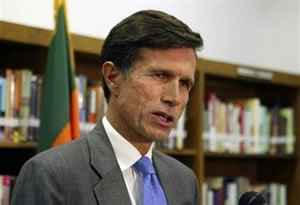Ilankai Tamil Sangam30th Year on the Web Association of Tamils of Sri Lanka in the USA |
||||
 Home Home Archives Archives |
Prabhakaran's Dream 'Not Out'As Foggy Bottom pontificatesby Sachi Sri Kantha, August 15, 2009
If you don’t mind, I’d say that Eelam Tamils have a curse in their backs. That of carrying the burden of the post-event, post-dated mea culpas of foreign dignitaries, who were dimwitted when they held an opportunity to influence events. These mea culpas have been delivered in memoirs, forewords (to books) and in interviews.
Today being Napoleon’s (1769-1821) 240th birthday, I’m reminded of the 116 days that elapsed between his escape from Elba to his final disaster at the Battle of Waterloo. If it took 116 days for Napoleon, just imagine that it has taken a mere 85 days for Foggy Bottom operative Mr. Robert Blake to realize the folly of his anti-Tamil actions while being stationed in Colombo for the past three years. According to word maven William Safire, in the American political lexicon 'Foggy Bottom' refers to the US State Department as its “offices were built on land that had originally been called Foggy Bottom, and the name was reapplied because it recalled a fogginess of official language” (Safire’s Political Dictionary, 3rd ed, 1980, pp. 237-238). In a typical Foggy Bottom phrasing, Mr. Robert Blake – the current US Assistant Secretary of State - observed in his interview to the Associated Press on August 10th, “The [Sri Lankan] government needs to find a way to move more quickly than January 2010. Because the risk, of course, is that people will become disaffected and that will give new impetus to terrorism.” The highfalutin' tone and deception of Mr. Blake’s diplomatese leaves much to be desired. If one translates the ‘Foggy Bottomese’ (aka diplomatese) of Robert Blake into simple English, “people” = Eelam Tamils, and “new impetus to terrorism” = Prabhakaran’s dream of Eelam is still alive. Reading between the lines, this can also be construed as a mea culpa of America’s high priest in Colombo for the past 3 years that he had underestimated Prabhakaran’s hold on Tamil psyche. Below I provide verbatim mea culpa of two of Mr. Blake’s predecessors among foreign dignitaries. First, it was Lord Soulbury in 1963, in his forward to Bertram H. Farmer’s aptly titled book Ceylon: A Divided Nation (1963); then it was J.N. Dixit in his memoirs Assignment Colombo (1998). Lord Solbury’s mea culpa in 1963 “A Commission of which I had the honour to be the Chairman, was appointed by the British Government in 1944, to examine and discus proposals for the constitutional reform of Ceylon. It did not take long to discover that the relations of minorities to majorities, and particularly of the Tamil minority in the northern and eastern provinces to the Sinhalese majority further south, were in the words of the Commission’s report ‘the most difficult of the many problems involved’. The Commission had of course a cursory knowledge of the age-long antagonism between these two communities, but might have been less hopeful of a solution had Mr. Farmer’s book been available to underline the deplorable effect of centuries of troubled history upon the Ceylonese of today.” “Needless to say the consequences have been a bitter disappointment to myself and my fellow Commissioners.” “Nevertheless – in the light of later happenings – I now think it is a pity that the Commission did not also recommend the entrenchment in the constitution of gurantees of fundamental rights, on the lines enacted in the constitutions of India, Pakistan, Malaya, Nigeria and elsewhere.” “Nevertheless the reconciliation of Tamils and Sinhalese will depend not on constitutional guarantees but on the goodwill, common sense and humanity of the Government in power and the people who elect it.” J.N. Dixit’s mea culpa in 1998 “I over-estimated the sincerity and the political will of Jayewardene to come to a genuine compromise with the Tamils with the help of the Government of India.” “I was convinced that the LTTE will not participate in any negotiated compromise. I, therefore, felt that India should deal with other Tamil groups bypassing the LTTE and isolating it. My assessment at that time was that if other Tamil groups join the Indian initiative, the LTTE can be successfully isolated initially which would compel it to join the peace process. I was wrong in this assessment.” “My expectation that the LTTE could be successfully isolated from Sri Lankan Tamils also proved to be wrong.” Coda The reflective candor of Lord Soulbury, J.N. Dixit and Robert Blake, though appreciated, could hardly heal the pain of Eelam Tamils, as it is merely a micro quantum salve for the buckets of blood Tamils have had to shed. The timidity of these high dignitaries deserves nothing but scorn, since a ‘cursory knowledge of the age-long antagonism” (Lord Soulbury’s phrase) between Sinhalese and Tamils has been the bane of these diplomat schmucks. ***** |
|||
|
||||
